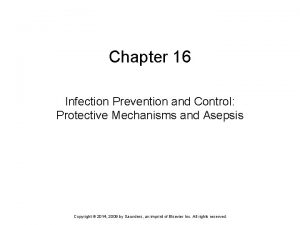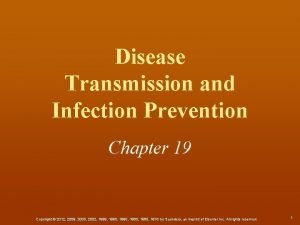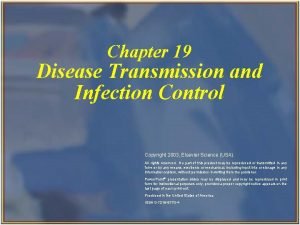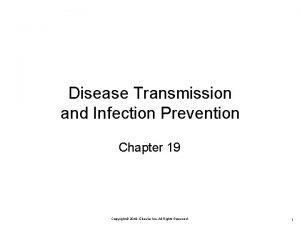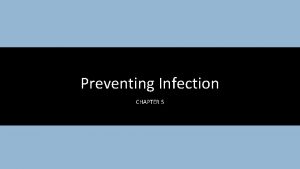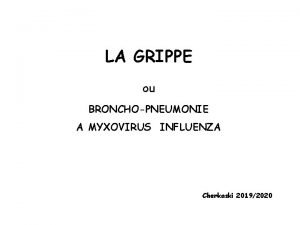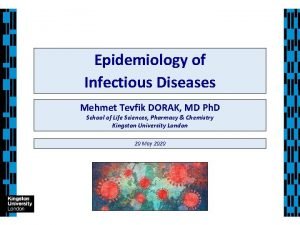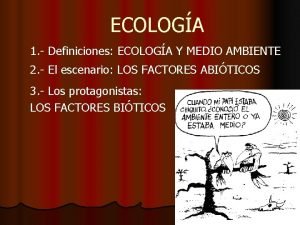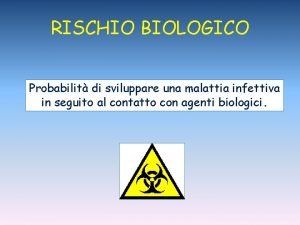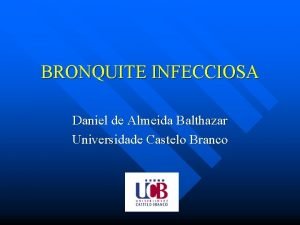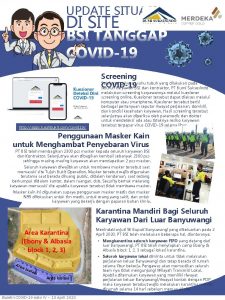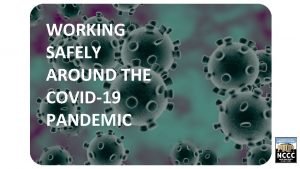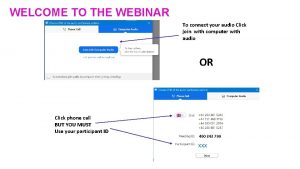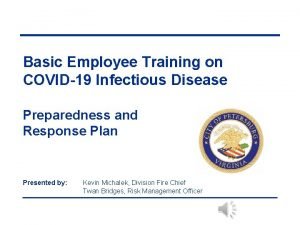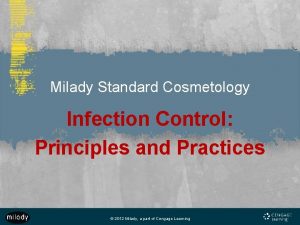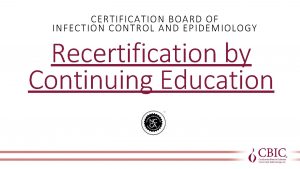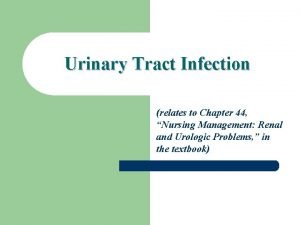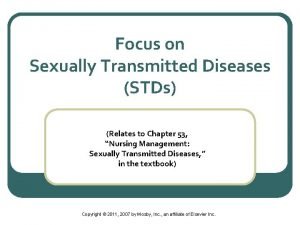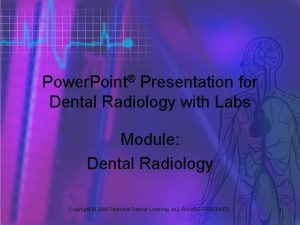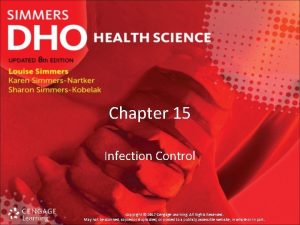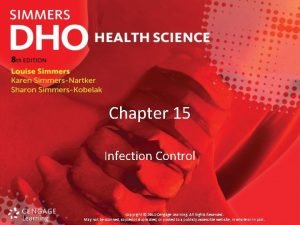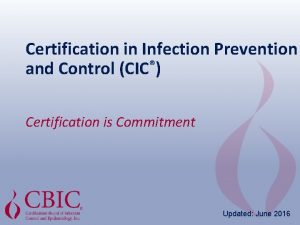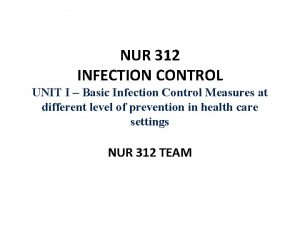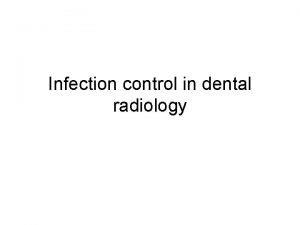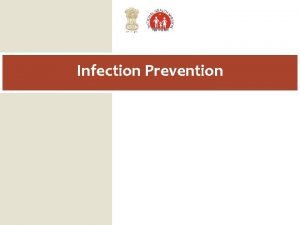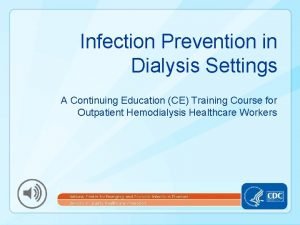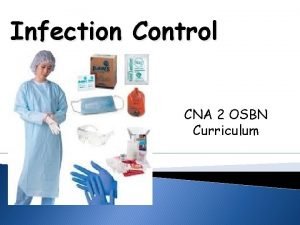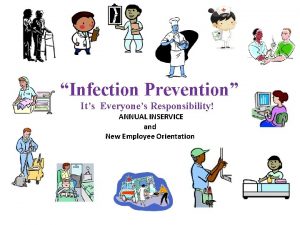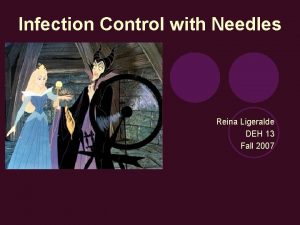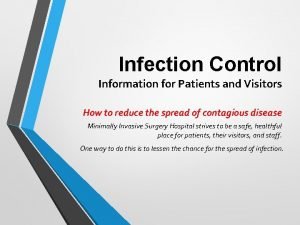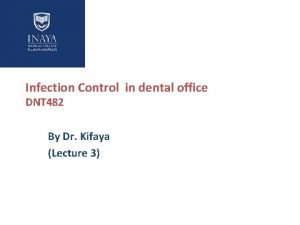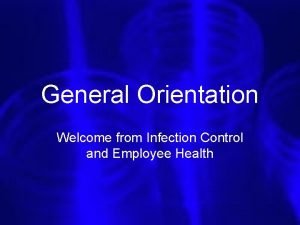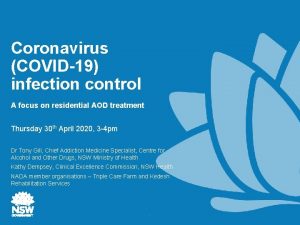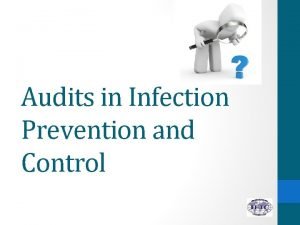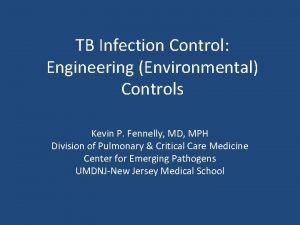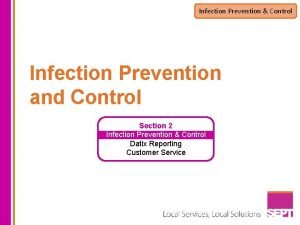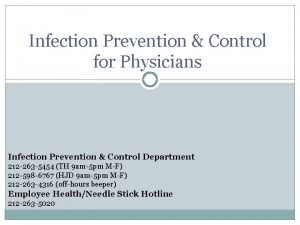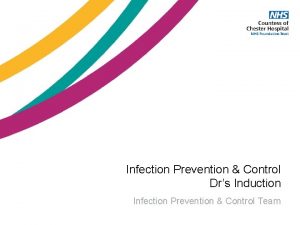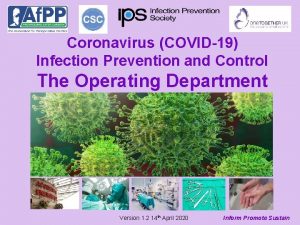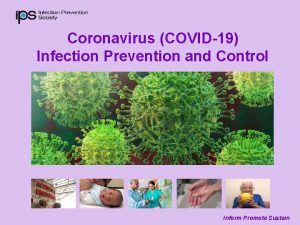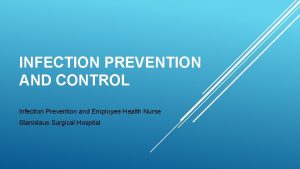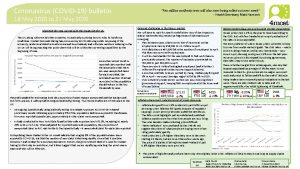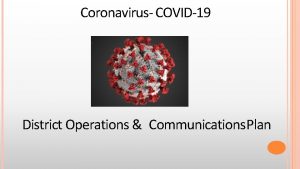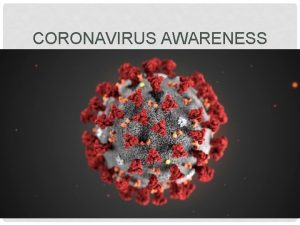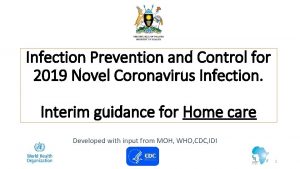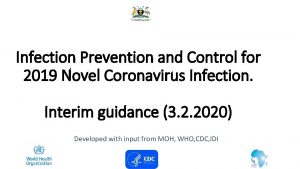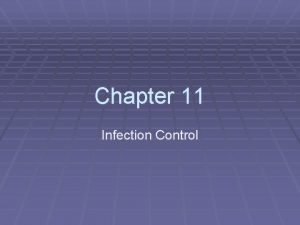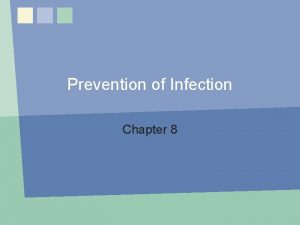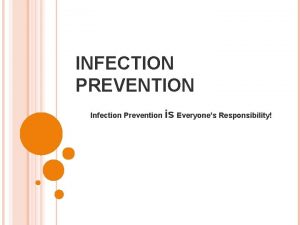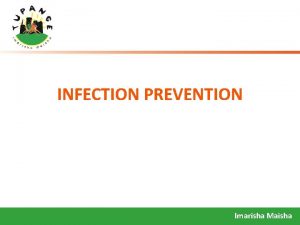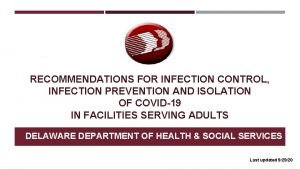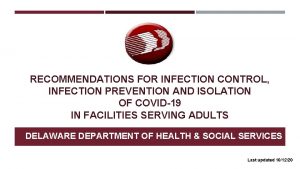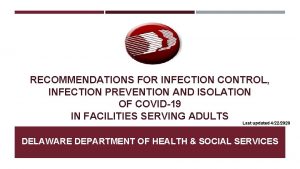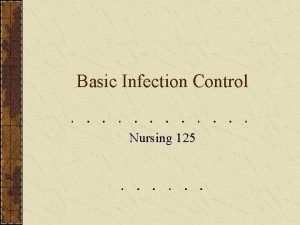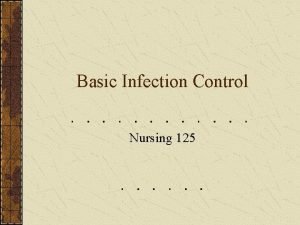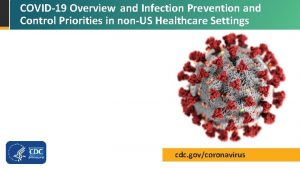Coronavirus COVID19 Infection Prevention and Control for Nursing









































- Slides: 41

Coronavirus (COVID-19) Infection Prevention and Control for Nursing & Residential Care Homes Version 1. 3 14 th May 2020 Inform Promote Sustain

What is Coronavirus and COVID-19 § Coronaviruses are a large family of viruses - they cause infections ranging from the common cold to Severe Acute Respiratory Syndrome (SARS) § Sometimes new variants of coronavirus emerge - such as SARS Co. V-2 which causes COVID-19 § SARS Co. V-2 has the potential to spread widely as lack of immunity means everyone in the population is susceptible Inform Promote Sustain

What are the symptoms of COVID-19? § Symptoms start 1 -14 days after exposure § Illness can be similar to flu § Most people have fever and dry cough (but less common in elderly) § Elderly people may present with confusion, lethargy, decline in alertness/mobility, diarrhea § Most people have symptoms for 5 - 6 days § 20% have more severe illness (from day 7) § Shortness of breath § Lung inflammation § Pneumonia Inform Promote Sustain

How severe is COVID-19 illness? § Many people have no obvious symptoms (30%) § Of those with symptoms 80% are mild § More severe disease in: § § § Older people Diabetics Heart disease Chronic respiratory disease Immune compromised § Only 1% of cases fatal Critical Respiratory/multi-organ failure Severe Shortness of breath; Respiration; O 2 sats Mild Fever, cough Undetected § Highest in high risk groups Inform Promote Sustain

How does COVID-19 spread? § Exposure to respiratory droplets § Coughing/sneezing droplets onto mouth, nose, eyes § Requires close contact (within 2 m) § Contact with respiratory secretions § Hands § Contaminated surfaces, tissues § Transferred by touching nose, mouth, eyes with contaminated hands Inform Promote Sustain

Sustained Community Transmission § This means that COVID-19 is affecting many people in the community and they may not all have had obvious contact with someone who had symptoms of the infection. § During this period of sustained community transmission infection control precautions will need to be taken with all residents not just those with symptoms of COVID-19 Inform Promote Sustain

Preventing the spread of COVID-19 Infection Prevention & Control 1. 2. 3. 4. 5. 6. 7. Cough etiquette Hand hygiene Personal protective equipment (PPE) Social distancing Protecting the vulnerable - shielding Isolation of symptomatic residents Cleaning Inform Promote Sustain

Personal hygiene to prevent spread § Cough etiquette § Cover mouth and nose with a tissue or your sleeve (not your hands) § Dispose of tissues directly into bin § Hand hygiene § after contact or coughing/sneezing Ensure residents have hand wipes or alcohol gel available Inform Promote Sustain

Hand Hygiene in care of all residents Hand hygiene is essential to prevent both staff and residents acquiring COVID-19 § Immediately before touching a resident § Immediately after touching a resident or their surroundings § After removing gloves Alcohol gel is effective against COVID-19 Soap and water should be used if hands are soiled Inform Promote Sustain

Other times when care workers should wash their hands Before § • • • leaving home food preparation eating any food eating snacks taking a break leaving work § § • • • After arriving at work Touching surfaces in residents’ rooms decontaminating equipment handling waste using the toilet after taking a break after smoking Inform Promote Sustain

How to hand wash § Wash hands AND forearms after close contact with a resident § If no elbow taps use a clean paper towel to turn it off NHS Hand wash video https: //www. nhs. uk/livewell/healthy-body/best-way-towash-your-hands/ Inform Promote Sustain

Patient hand hygiene § Encourage residents to clean their hands § After coughing/sneezing § Before eating § After using the toilet § Hand wipes or alcohol gel need to be easily available for the resident to use Inform Promote Sustain

Personal Protective Equipment (PPE) § PPE will only prevent spread of infection if it is: üUsed and changed at the right time üAccompanied by good hand hygiene üCough etiquette is applied § Mobile phones should not be used whilst wearing PPE § All staff, including cleaners & housekeepers, must be trained in how to use PPE Inform Promote Sustain

Disposable Gloves § Wear for any care that involves touching a resident § Wear within 2 metres of a resident who is coughing § Remove and wash hands between different tasks e. g. between helping a resident to the toilet and mouth care § Always remove gloves and wash hands after handling body fluids § Remove gloves and wash hands after each episode of care Be careful not to touch your mouth, nose or eyes while wearing gloves Inform Promote Sustain

Disposable Plastic Aprons § Wear for any care that involves touching a resident § Wear when within 2 metres of a resident who is coughing Use to protect your uniform or clothes from contamination when providing care Remove and discard apron after each episode of care Inform Promote Sustain

Fluid Resistant Surgical Masks § Masks protect: o your nose & mouth from respiratory droplets from residents o residents and other staff from respiratory droplets from your mouth and nose (as you might be carrying the infection) § You can wear a mask for caring for different residents BUT do not touch the mask o you could transfer virus to your hands § Wear the mask on your face – NOT round your neck § Remove and discard the mask when: o you take a break or finish your shift o it is damp, soiled, uncomfortable, difficult to breathe Inform Promote Sustain

Eye Protection § Wear for direct contact with residents if there is a risk of respiratory droplets getting into eyes o e. g. resident who is coughing or vomiting § Clean after each use using either: § § disinfectant wipe detergent and water followed by chlorine disinfectant 1000 ppm check manufacturer’s guidelines Inform Promote Sustain

Watch the video https: //youtu. be/oz. Y 50 PPmsv. E Inform Promote Sustain

Take PPE off carefully to avoid contaminating yourself Watch the video https: //youtu. be/o z. Y 50 PPmsv. E Inform Promote Sustain

Summary of PPE Clinical Gloves Period of use Direct contact with resident Plastic Aprons Single use ✔ ✔ Fluid Resistant Eye Mask protection Session of care ✔ Assess risk Resident coughing (within 2 m) ✔ ✔ ✔ Assess risk No direct resident contact ✗ ✗ ✔ ✗ Communal areas ✗ ✗ ✔ Inform Promote ✗Sustain

PPE for Aerosol Generating Procedures Some procedures on patients who have COVID-19 can generate tiny particles from the respiratory tract which might be inhaled by people in the room § Undertake these procedures in a single room § Only people involved in procedure should be present § Wear high level PPE Aerosol Generating Procedures* Ø Long-sleeved gown Airway suctioning (open system) Ø Eye protection (visor or goggles) Intubation & extubation Ø FFP 3 respirator High flow nasal oxygen Sputum induction (by physiotherapists) Non-invasive ventilation (Bi. PAP, CPAP) * Check www. gov. uk for updates to list Inform Promote Sustain

Putting on & removing PPE for AGP Inform Promote Sustain

Social distancing & shielding § Avoid close contact (2 metres) between all people in the home § Ensure elderly/vulnerable residents are shielded: § Stay in the home § Avoid close contact with other residents/visitors § Isolate residents with symptoms § Check residents and staff daily for symptoms of COVID-19 Common Symptoms of COVID-19* Fever >37. 8 o. C Dry cough Fatigue Sputum Shortness of breath Muscle/joint pain Sore throat Headache Hoarseness Nasal discharge *In elderly other signs include: confusion/lethargy, mobility/alertness, diarrhoea Inform Promote Sustain

Contact your local Health Protection Unit What to do if there is an outbreak? If 2 or more residents develop symptoms of COVID 19 § Isolate those with symptoms in a single bedroom § Resident should stay in their room (including for meals) § Isolate for 14 days § If not en-suite – dedicate nearly bathroom to the resident § Isolate residents who have been in close contact with symptomatic residents in a single bedroom § for 14 days after exposure to a possible case § Dedicate medical equipment for COVID-19 residents § eg thermometers, pulse oximeters § Clean and disinfect before use on another resident § Do not store PPE in room Inform Promote Sustain

Arranging for COVID-19 testing § Testing for all symptomatic residents reported when outbreak notified with be arranged by Public Health England § Testing kits will be posted to the home. § CQC/NHS and local structures will organise: § Testing of all subsequent residents who develop symptoms. § Testing of staff/and or symptomatic household contacts § Liaise with Local Resilience Forum or Local Authority https: //www. gov. uk/guidance/coronavirus-covid-19 -getting-tested#care-home Further information: Covid-19 Adult Social Care Action Plan https: //www. gov. uk/government/publications/coronavirus-covid-19 -adult-social-care-actionplan/covid-19 -our-action-plan-for-adult-social-care#controlling-the-spread-of-infection-in-caresettings Inform Promote Sustain

Collecting COVID-19 samples § Equipment required: o o o Plastic apron Fluid resistant surgical face mask Eye protection Gloves Viral swab § Swab the back of the throat (each side), then nose § Offer a tissue and water afterwards Inform Promote Sustain

Sending COVID-19 swabs for testing § Insert swab into transport media § Snap the stick at the line & securely close Break at line § Complete label o name, date of birth and NHS number o sample type = ‘nose & throat’ § Place sample in 2 bags § Complete E 28 form https: //www. gov. uk/gover nment/publications/testin g-for-wuhan-novel-cov 2019 -ncov Inform Promote Sustain

How to take nose and throat swab https: //youtu. be/9 Wayj. X 6 v. Cdk Inform Promote Sustain

Managing residents who are ‘walking with a purpose’ § Try to promote cough etiquette § Try to promote hand cleansing § offer them hand wipes regularly § Try to guide the resident back to their room. § Clean high touch surfaces more frequently § hand rails, door handles, tables etc Inform Promote Sustain

Managing contact between staff and residents § Residents § If extremely vulnerable should be placed in single room and not share bathroom with other residents § Symptomatic resident should wear surgical face mask (if possible) to transfer between rooms § Staff § Where possible staff should be allocated to work with EITHER symptomatic or non-symptomatic residents § Staff who have previously tested positive for COVID-19 should care for symptomatic residents (still use PPE) Inform Promote Sustain

Waste from rooms of residents with COVID-19 § Waste should be removed at least daily § Discard as infectious (orange bag) waste stream § If no infectious waste stream o store securely for 72 hrs and discard as household waste Inform Promote Sustain

Laundry from rooms of residents with COVID-19 § Linen and clothing can be decontaminated by usual washing process § Treat as infectious waste o Place directly into alginate (dissolvable) bag o Place this into an outer plastic bag outside the room o Can be laundered immediately § Bring laundry hamper close to room § Do not take in the room § Do not shake or sort linen § Do not put used linen on floor or other surfaces Inform Promote Sustain

Staff uniform and safety at home Personal hygiene Uniforms § Wash hands and forearms before leaving the home § Wash hands again when arrive home § Use dedicated work clothing if no uniform § Protect from contamination during day with plastic aprons § Change out of uniform before leaving the home (take home in a plastic bag) § Wash uniforms separately to other household linen § Avoid overloading - dilution important for removing dirt & contamination § Can be tumble dried and ironed with household laundry. o Virus easily removed by soap and water and alcohol gel § Personal items do not need to be decontaminated o These are not in contact with respiratory secretions from patients Inform Promote Sustain

Minimising environmental contamination in the home § Regular cleaning throughout the home prevents surfaces becoming contaminated with virus § Open windows to allow fresh air to circulate § Use detergent/disinfectant solution for cleaning hard surfaces: o Preferably 1000 ppm chlorine disinfectant o If another disinfectant (check efficacy with manufacturer) o Ensure disinfectants marked EN 14776 Virucidal properties § Use detergent to clean soft furnishing (if likely to be damaged by chlorine disinfectant) or consider steam cleaning § Discard items heavily contaminated by body fluids if not washable § Use disposable cloths § Launder mop heads (daily last in the last wash) or use disposable Inform Promote Sustain

Cleaning staff § Ensure they know what PPE they should wear and have received training Clinical Gloves Period of use Cleaning Plastic Aprons Single use ✔ Fluid Resistant Mask Eye protection Session of care ✔ ✔ Assess risk § Clean all surfaces in resident rooms o especially high touch areas e. g bedrails, bathrooms § Discard cleaning solution at a disposal point o Clean mop handle & bucket § Remove waste and linen Inform Promote Sustain

Additional procedures for cleaning rooms of residents with COVID-19 § § § Clean rooms of residents with COVID-19 last Use disposable cloths Use disposable mop head Discard cleaning solution at a disposal point Clean mop handle & bucket Remove waste and linen Inform Promote Sustain

Cleaning room of resident with COVID-19 who has died § Clean all surfaces o o high level windows, ledges and sills, curtain rails lower level windows, ledges and sills furniture, fixtures and fittings, en-suite rooms door handles, light switches, soap & towel dispensers § Clean all surfaces of mattress and bed o Unzip mattress – check foam for strike through – replace if soiled § § Mop hard floor surfaces Shampoo carpet and fabric chairs or use a steam cleaner Discard waste (as clinical waste) Place laundry in dissolvable bag and return to laundry Inform Promote Sustain

Staff with COVID-19 § If you develop symptoms of a flu-like illness then DO NOT come into work and inform you manager: o fever of more than 37. 8 o. C and new persistent cough o other symptoms of respiratory infection § Self-isolate at home for 7 days from onset of symptoms o Arrange to take a COVID-19 test Ø within 3 -4 days of start of symptoms Ø if you are better and the test is negative your can return to work o If your symptoms worsen contact NHS 111 § If a member of your family develops symptoms o Arrange for them to have a COVID-19 test (if possible) o If this is negative you can return to work o If no test or test is positive then self-isolate for 14 days § Staff at high risk of complications from COVID-19 o risk-assessment to manage if and where they can work Inform Promote Sustain

Facilitating visits by relatives for residents with COVID-19 receiving end of life care § A visit by a one or two close relatives to a resident who is dying should be facilitated if possible § They should be given a clear description of what to expect § It is reasonable to consider the visits as ‘essential travel’ under the principles of social distancing § The visitor does not need to wear gloves to hold their loved one hand – but advised not to touch their mouth, nose or eyes and wash their hands when leaving the room § Visitors will need to be shown how to put on and take off a face mask and apron Inform Promote Sustain

Useful resources Public Health England Coronavirus (COVID-19) guidance https: //assets. publishing. service. gov. uk/government/uploads/system/uploads/attachment_data/file/881329/ COVID-19_How_to_work_safely_in_care_homes. pdf https: //assets. publishing. service. gov. uk/government/uploads/system/uploads/attachment_data/file/880274/ Admission_and_Care_of_Residents_during_COVID-19_Incident_in_a_Care_Home. pdf https: //www. gov. uk/government/publications/wuhan-novel-coronavirus-infection-prevention-and-control Public Health England Campaign Resources https: //campaignresources. phe. gov. uk/resources/campaigns/101 -coronavirus- NHS website https: //www. nhs. uk/conditions/coronavirus-covid-19/ Infection Prevention Society https: //www. ips. uk. net/professional-practice/resources 1/covid-19 -advice-and-guidance/#. Xq. VO 5 hd 7 m. V 4 IPS/BACN Compassionate end of life care: https: //www. ips. uk. net/files/5415/8713/0634/Joint_IPS_BACCN_Position_Paper___COVID 19_Visiting_at_the_End_of_Life_Final. pdf World Health Organization https: //www. who. int/emergencies/diseases/novel-coronavirus-2019 Inform Promote Sustain

IPS Training Resource § Developed by: § Jennie Wilson, IPS Vice-President § Lisa Renshaw (Chair, Care Home Special Interest Group) § Hannah By. South, Royal National Orthopaedic NHS Trust § Available from: https: //www. ips. uk. net/ Inform Promote Sustain
 Primary prevention secondary prevention tertiary prevention
Primary prevention secondary prevention tertiary prevention Chapter 16 infection prevention and control
Chapter 16 infection prevention and control Puncture resistant container
Puncture resistant container Chapter 19 disease transmission and infection prevention
Chapter 19 disease transmission and infection prevention Chapter 19 disease transmission and infection prevention
Chapter 19 disease transmission and infection prevention Define infection prevention chapter 5
Define infection prevention chapter 5 Scissurite coronavirus
Scissurite coronavirus Relazione finale disciplinare scuola primaria
Relazione finale disciplinare scuola primaria Mehmet dorak
Mehmet dorak 3 abioticos
3 abioticos Rischio biologico coronavirus | titolo x d.lgs. 81/08
Rischio biologico coronavirus | titolo x d.lgs. 81/08 Allegato xlvi del d.lgs. 81/08 coronavirus
Allegato xlvi del d.lgs. 81/08 coronavirus Bronquite coronavirus
Bronquite coronavirus Http://apps.tujuhbukit.com/covid19/
Http://apps.tujuhbukit.com/covid19/ Do if you covid19
Do if you covid19 Covid19 athome rapid what know
Covid19 athome rapid what know What do if test positive covid19
What do if test positive covid19 Vaksin covid19
Vaksin covid19 Chapter 16 infection control and standard precautions
Chapter 16 infection control and standard precautions Infection control principles and practices milady
Infection control principles and practices milady Cbic recertification
Cbic recertification Nursing management for urinary tract infection
Nursing management for urinary tract infection Nursing management of reproductive tract infection
Nursing management of reproductive tract infection Dental radiography techniques ppt
Dental radiography techniques ppt Chapter 15:8 using sterile techniques
Chapter 15:8 using sterile techniques Chapter 15:7 cleaning with an ultrasonic unit
Chapter 15:7 cleaning with an ultrasonic unit Cic certification exam
Cic certification exam Infection control definition
Infection control definition Infection control in dental radiology
Infection control in dental radiology Learning objectives for infection control
Learning objectives for infection control Infection control conclusion
Infection control conclusion Osbn cna
Osbn cna Infection control is everyone's responsibility
Infection control is everyone's responsibility Infection control
Infection control Tier 1 standard precautions
Tier 1 standard precautions Infection control information
Infection control information Root locus drawer
Root locus drawer Infection control orientation
Infection control orientation Infection control
Infection control Infection control audits
Infection control audits Environmental controls infection control
Environmental controls infection control Infection control isolation signs
Infection control isolation signs

